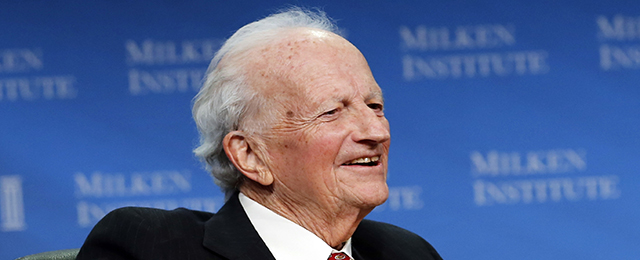Our encounter had taken place in Becker’s office at the University of Chicago, a small room with two desks and a blackboard full of formulas, almost cartoonish to the extreme. In 1996, I noticed he had no computer. In 2006, he did. Becker had quickly adapted to the Internet age. He had stopped writing his columns for Business Week in order to start a blog with his friend, jurist Richard Posner. At that time, having great intellectuals blogging was something relatively new. The brainy Becker-Posner Blog lasted until March. Its last entry was on article on the need to lift the Cuban embargo. The penultimate was defending the legalization of marijuana in all the United States.
Becker was very opinionated. In his lectures, columns, interviews and articles, he talked about everything. That made him popular, but also somewhat diminished his intellectual prestige. He wrote in Business Week in favor of the independence of certain European regions because small businesses are more dynamic than large.
“In a small country there is a higher concentration of stakeholders that provides a better management of economic policy,” he told me in 2006. And I still did not understand it. Is El Salvador better managed than Mexico? Why, then, does the U.S. not give independence to the south of the country, which lives on subsidies from both coasts?
Sometimes, while interviewing Becker, I wondered if he was an actual classical liberal (in the European sense) or, simply, a conservative who covered his ideology under the mantle of liberalism. He was an enemy of deficits, but did not support Bill Clinton, the only American president who has had budget surpluses since Jimmy Carter (both, coincidentally, Democrats).
Perhaps the biggest criticism that can be thrown at Becker is that, throughout his academic career, he turned everything into Economics.
“I have come to the conclusion that the economic approach is comprehensive and applies to all human behavior” he wrote in The Economic Approach To Human Behavior. In 1992, he won the Nobel Prize for “having extended the domain of microeconomic analysis to a wide range of human behavior.”
The last time I saw him was on November 21, 2011, at the University of Chicago’s Quadrangle Club, during a tribute to Tom Sargent and Chris Sims. By then, the world had changed. Rather than applying economic analysis to society or human behavior, the reverse was in fashion: applying Psychology to Economics. Probably, if Becker had done his research a little earlier or a little later he would not have won the Nobel Prize. Time was on his side: he was a liberal economist when both doctrines were booming.






It’s Richard Posner.
Mr. Posner’s name has been corrected. Our sincere apologies and thanks for the feedback.
The Becker-Posner blog was written with jurist Richard Posner. I don’t know who “Adam Posner” is.
Anyone that could write “if Becker had done his research a little earlier or a little later he would not have won the Nobel Prize” either knows very little about economics or Gary Becker’s actual work.
Mr. Posner’s name has been corrected. Our sincere apologies and thanks for the feedback.